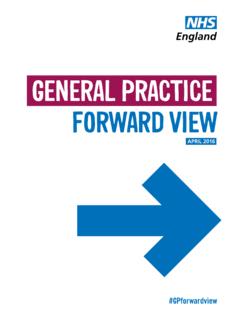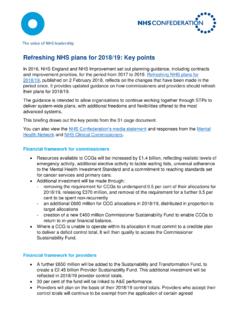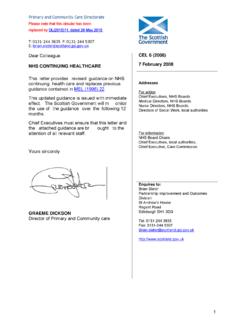Transcription of HEALTH CARE STANDARDS F R WHEELCHAIR …
1 HEALTH care STANDARDS for WHEELCHAIR services under The NHS STANDARDS for Better HEALTH HEALTH care STANDARDS FR WHEELCHAIR services under THE NHS Agreed by the National WHEELCHAIR Managers Forum with the British Society of Rehabilitation Medicine, emPOWER, National Forum of WHEELCHAIR User Groups, NHS Purchasing and Supply Agency, Posture & Mobility Group and Whizz-Kidz Version 005. March 2005 March 2005 1 HEALTH care STANDARDS for WHEELCHAIR services under The NHS Foreword People with severe mobility impairments are entitled to first class WHEELCHAIR services . These national minimum STANDARDS , supported by the people who use and provide wheelchairs , underpin the collective determination to ensure a first class service. They will be kept under review, with our sights firmly set on still further improving performance, and the quality and safety of care .
2 Background High quality WHEELCHAIR services are a vital key to the independence of people of all ages, with severe mobility impairments. Until 31 March 1991 the Disablement services Authority (DSA), established following a review commissioned by the Department of HEALTH and Social Security in 1989, managed the NHS WHEELCHAIR Service in England. With the termination of the DSA, management of the Service was devolved in England on 1 April 1991 to 151 local HEALTH Authorities and Trusts. (In Scotland, Wales and Northern Ireland various other organisational changes and arrangements currently exist.) There emerged forthwith inequitable variations in prescribing, management structures, staffing, criteria, funding, costs and levels of services , all with us today. It is therefore not surprising that, previously, no national minimum STANDARDS have existed. Introduction Reflecting the needs of Users, and in accord with legal requirements, the following minimum national STANDARDS and best practice framework have been agreed for NHS WHEELCHAIR and Specialised services throughout the UK.
3 They assume the provision of adequate resources and continued professional development, to enable members of the healthcare professions, with the Users, to get it right first time, and to keep it right. Users should not be discriminated against, for example with regard to age in provision. It is also important that children and young people are assessed for their developmental needs and educational requirements, as well as their clinical/physical needs. This may involve meeting any individual s needs through partnership working and funding. Definition The WHEELCHAIR services have been developed to provide essential mobility and associated postural management based on the needs of the referred client. A continuing review and provision process allows the service to best meet the client s changing needs. The service provides clinically based assessment and prescription of manual and powered wheelchairs , specialised seating and cushions, modifications and accessories.
4 Assessment will also include those associated with the client, such as family, carers, guardians, teachers, allied HEALTH care professionals, etc. Due to the nature of the client base the WHEELCHAIR service will also provide equipment maintenance facilities and client review programmes in keeping with nationally recognised STANDARDS These National STANDARDS must be read within the context of the Department of HEALTH s National STANDARDS , Local Action - HEALTH & Social care STANDARDS & Planning Framework and support the implementation of National Service Frameworks, guidance from the National Institute for Clinical Excellence and performance assessment by the March 2005 2 HEALTH care STANDARDS for WHEELCHAIR services under The NHS Healthcare Commission. All staff will be registered with their relevant professional body and meet the National Occupational STANDARDS as appropriate. This will include continual professional development to ensure the future development of service provision.
5 1. Aim of Service Each WHEELCHAIR Service (hereinafter referred to as the Service ) will provide a comprehensive service for people of all ages with long-term mobility problems and associated postural needs in accordance with statutory requirements (see Appendix 1). 2. Access to Service The service is open to all NHS residents within a defined catchment area, as defined in the DOH document Establishing the Responsible Commissioner 2002. The service may be provided as a totally in-house service, or may be contracted out in part or full depending on local resources, geographic location and the presence of other rehabilitation services . Minimum Response times are given in Appendix are minimum acceptable STANDARDS accepted by national user groups as being fair and reasonable. 3. Publicity and Information The Service will publicise widely, in accessible formats, information about the services and facilities it provides, including eligibility criteria, and the NHS complaints procedure.
6 Users and Carers will receive clear and appropriate information about the Equipment supplied, full tuition and a single point of contact for any subsequent enquiries. 4. Eligibility Criteria Each service should develop eligibility criteria in conjunction with the service commissioners and local users. Eligibility criteria should include clinical and lifestyle needs and the ability of the client to use the specified WHEELCHAIR safely. Exclusions on the grounds of age or prognosis alone are unacceptable and discriminatory. Eligibility criteria should be subject to ongoing review. services should consider, in appropriate circumstances, joint funding with other agencies. 5. Referrals Within the NHS referral forms should include the minimum national data set in Appendix 3, and its use by non-NHS personnel/organisations is to be encouraged. Incomplete referrals will be returned to the Referrer. Existing clients to the service may self-refer.
7 Service approved personnel will screen all referrals. All referrals will be prioritised using such measures as Condition, Prognosis, Social situation, Usage, etc (prioritisation by age shall be deemed as discriminatory). The referrer and client (family/guardian) shall be informed of the receipt and expected waiting time. In the case of new client s information about the assessment process, the service and any exploratory information required from the client, family, key workers or other stakeholders will be sent prior to the first appointment. March 2005 3 HEALTH care STANDARDS for WHEELCHAIR services under The NHS 6. Assessment Assessment should be in the most appropriate environment (see Appendix 4). Every Assessor for the Prescribing of wheelchairs will have a recognised qualification and appropriate current experience in WHEELCHAIR assessment as identified in the National Occupational STANDARDS related to job function.
8 Every Assessment will be recorded, including objectives agreed with the user. Where appropriate, the assessment will be carried out in conjunction with the multidisciplinary team (MDT). Joint assessments with other appropriate agencies should also be encouraged to provide a holistic approach to client total needs. The assessment process will comply with clinical audit requirements and national risk management policy. All assessment reports shall identify clinical and equipment review frequency. In order to help to identify local client trends a classification of each user should be recorded with regard to the guidelines in Appendix 5. 7. Prescription Effective and economical deployment of limited resources, giving the greatest good for the greatest number, requires prescription of the least expensive solution which will meet the applicant s assessed clinical and lifestyle needs. (Service should give consideration to whole life costs of equipment) The Prescriber will be a named individual, to whom that responsibility has been formally delegated, and who may or may not be the Assessor.
9 8. Equipment Provision and Procurement The range and specifications of all equipment, sufficient to meet assessed needs, will be determined by the local focus group which should include Commissioners, Service staff, Users and Carers. The purchasing strategy will ensure that clinical need is met whilst providing value for money and compliance with the Trust s procurement strategy. The Service will ensure that it is cost effective and achieves value for money when purchasing equipment. Stock levels will be set to achieve the standard time from referral to delivery. Usage figures will be checked to determine min/max levels of stock, on the whole range of equipment. All min/max levels will be constantly reviewed. Systems will be in place to order non-stock items quickly. All new equipment purchased will comply with the essential requirements of the CE marking regulations. The Service will collaborate positively and proactively with the NHS PURCHASING AND SUPPLY AGENCY in all relevant aspects of that Agency's services .
10 The Service will collaborate positively and proactively with the MEDICINES AND HEALTHCARE PRODUCTS REGULATORY AGENCY in all relevant aspects of that Agency s work including Disability Equipment Evaluation, and Adverse Incident Investigation. March 2005 4 HEALTH care STANDARDS for WHEELCHAIR services under The NHS 9. Handover Handover will be the responsibility of named qualified staff in accordance with the National Repair and Maintenance Contract Template attached as Appendix 6. The client/carer training content will accord with original manufacturer s instructions, and will meet risk management and controls assurance requirements as developed during the assessment \ prescription stages. Necessary information will be provided on use, adjustment and limitations of the WHEELCHAIR , including the manufacturer/s handbook. (Reconditioned equipment must be issued with appropriate documentation.)








